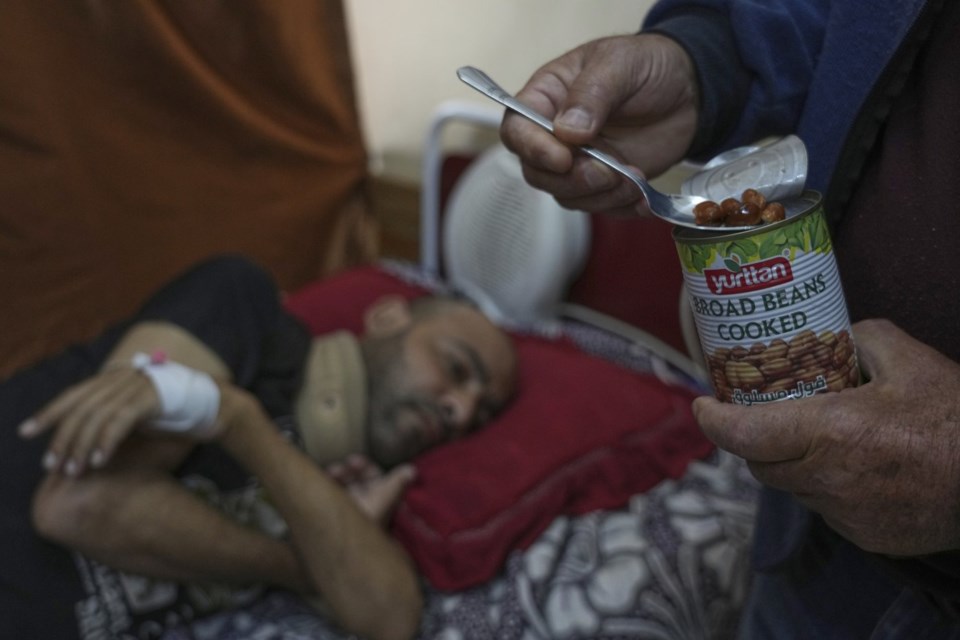KHAN YOUNIS, Gaza Strip (AP) â It cost a fortune, she said, but Asmaa Fayez managed to buy a few zucchinis in a market. She cooked them with rice and brought it to her 4-year-old son, who has been in the hospital for the past week. The soup was his only meal of the day, and he asked for more.
âItâs all finished, darling,â Fayez replied softly. Still, it was an improvement from the canned beans and tuna she brings on other days, she said.
Hospital patients are among the most vulnerable as Palestinians across Gaza struggle to feed themselves, with entering the territory now in its third month.
With hospitals unable to provide food, families must bring whatever they can find for loved ones.
âMost, if not all, wounded patients have lost weight, especially in the past two months,â Dr. Khaled Alserr, a general surgeon at Nasser Hospital in the southern city of Khan Younis, told The Associated Press. Nutritional supplements for intensive care unit patients are lacking, he said.
âOur hands are tied when it comes to making the best choice for patients. Choices are limited,â he said.
Hunger worsens as supplies dwindle
across Gaza, aid groups say. have been found with acute malnutrition in the past month, but adults as well are not getting proper nutrients, according to the U.N. It estimates that 16,000 pregnant women and new mothers this year face acute malnutrition.
Since Israelâs blockade began on March 2, food sources have been drying up. Aid groups have stopped food distribution. Bakeries have closed. Charity kitchens handing out bowls of pasta or lentils remain the last lifeline for most of the population, but they are rapidly closing for lack of supplies, the U.N. says.
Markets are empty of almost everything but canned goods and small amounts of vegetables, and prices have been rising. Local production of vegetables has plummeted because Israeli forces have damaged 80% of Gaza's farmlands, the U.N. says, and much of the rest is inaccessible inside .
Fayezâs son, Ali al-Dbary, was admitted to Nasser Hospital because of a blocked intestine, suffering from severe cramps and unable to use the bathroom. Fayez believes itâs because he has been eating little but canned goods. She splurged on the zucchini, which now costs around $10 a kilogram (2.2 pounds). Before the war it was less than a dollar.
Doctors said the hospital doesnât have a functioning scanner to diagnose her son and decide whether he needs surgery.
Israel says it imposed the blockade and resumed its military campaign in March to pressure Hamas to release its remaining hostages and disarm.
Hamas ignited the war with its Oct. 7, 2023, attack on Israel, in which militants killed some 1,200 people, mostly civilians, and took 251 hostage, most of whom have been released in ceasefire agreements or other deals. Israel's offensive has killed over 52,000 Palestinians, mostly women and children, according to Gaza's Health Ministry, which does not say how many of the dead were civilians or combatants.
Concern over Israeli plans to control aid
Israeli officials have asserted that enough food entered Gaza during a two-month ceasefire earlier this year. Rights groups have disputed that and called the blockade a âstarvation tacticâ and a potential war crime.
Now in Gaza, using private contractors to distribute supplies. The U.N. and aid groups have rejected the idea, saying it could restrict who is eligible to give and receive aid and could force large numbers of Palestinians to move â which would violate international law.
Those under care at hospitals, and their families who scrounge to feed them, would face further challenges under Israel's proposal. Moving to reach aid could be out of the question.
Another patient at Nasser Hospital, 19-year-old Asmaa Faraj, had shrapnel in her chest from an airstrike that hit close to her tent and a nearby charity kitchen in camps for displaced people outside Khan Younis.
When the AP visited, the only food she had was a small bag of dates, a date cookie and some water bottles. Her sister brought her some pickles.
âPeople used to bring fruits as a gift when they visited sick people in hospitals,â said the sister, Salwa Faraj. âToday, we have bottles of water.â
She said her sister needs protein, fruits and vegetables but none are available.
Mohammed al-Bursh managed to find a few cans of tuna and beans to bring for his 30-year-old son, Sobhi, who was wounded in an airstrike three months ago. Sobhiâs left foot was amputated, and he has two shattered vertebrae in his neck.
Al-Bursh gently gave his son spoonfuls of beans as he lay still in the hospital bed, a brace on his neck.
âEverything is expensive,â Sobhi al-Bursh said, gritting with pain that he says is constant. He said he limits what he eats to help save his father money.
He believes that his body needs meat to heal. âIt has been three months, and nothing heals,â he said.
___
Follow APâs war coverage at
Mohammed Jahjouh, The Associated Press




